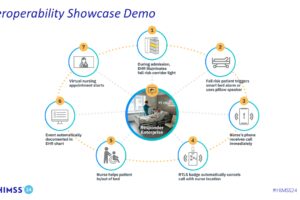In recent times, tech giants have been falling over themselves in a race to offer consumers the best access to their health data, including even dark horses like Amazon. And it’s little wonder – it’s become increasingly obvious that he who controls patient health data access controls a critical sector of the entire healthcare industry.
The most recent stake in the ground comes from Apple, whose latest update to its Health app allows customers to see their medical records on their iPhone. The Health Records section of the Health app, which comes with the release of the iOS 11.3 beta, collects FHIR-based records from multiple sources and makes them available through its Health Records section.
The patient data display will pull together patient data from various healthcare organizations into a single view. The data will include lists of allergies, conditions and medications taken, immunizations records, lab results on procedures and vital sign information. When providers published new information, iPhone users will be notified.
To conduct its Health Records beta test, Apple has partnered with a number of high-profile health systems and hospitals, including Johns Hopkins Medicine; Cedars-Sinai; Penn Medicine; Geisinger Health System; UC San Diego Health; UNC Health Care; Rush University Medical Center; Dignity Health; Ochsner Health System; MedStar Health and OhioHealth.
As part of its launch, Apple told the New York Times that unless consumers specifically choose to share it with the company, it will never see the data, which will be encrypted and stored locally on the iPhone. A recent (if unscientific) poll suggests that consumers trust Apple with their health data more than other top tech vendors, so this reassurance may be enough to ease their fears.
But security is hardly Apple’s biggest concern. How does the tech colossus expect to profit from its health data investments? When I break the issues down, it looks like this:
- Unlike hospitals and clinics, which can expect medium- to long-term ROI when patients manage their health better, Apple doesn’t deliver care.
- Apple might want to sell anonymized aggregated patient data, but as far as I know, the company would still have to get patient permission, and that would be an administrative and legal nightmare.
- If Apple or its competitors have some vision of selling access to the patient, good luck with that. Providers have a hard time attracting and keeping patients with nifty technology even if those patients live in their backyard.
While I could be missing something major, from what I see, Apple, Google, Samsung, Amazon and the rest are engaging in a series of preemptive patient data land grabs. My sense is that none of them know exactly what to do with this data, they’ll be damned if they’re going to let their competitors get there first.
That said, many in the industry are suggesting that this move is just another effort by Apple to sell more iPhones. The question I ask is how valuable will the information be to the patients? Certainly the beta hospitals and health systems are large and have a lot of data, but how is this going to scale down to the smaller providers? If you don’t have these smaller providers, then you’re going to be missing some of the most important health data.














Great observations, Anne! I’m thinking Apple can monetize the data without ever seeing it. If I have my records on my iPhone, I might purchase additional apps that make use of the data… appointment app, prescription savings app, diagnostic app. Endless possibilities, and Apple never sees my data. Apple takes their cut of every app sale, and they may author some apps themselves. And, I can see many health-conscious people buying an iPhone for this health ecosystem (if the vision comes to fruition). I do think there is a scalability issue like you point out. I believe Apple will need a business associate agreement with every provider (per HIPAA).